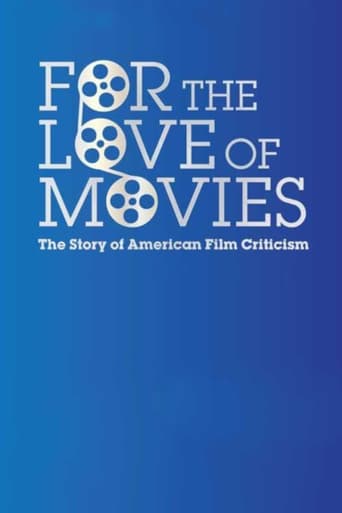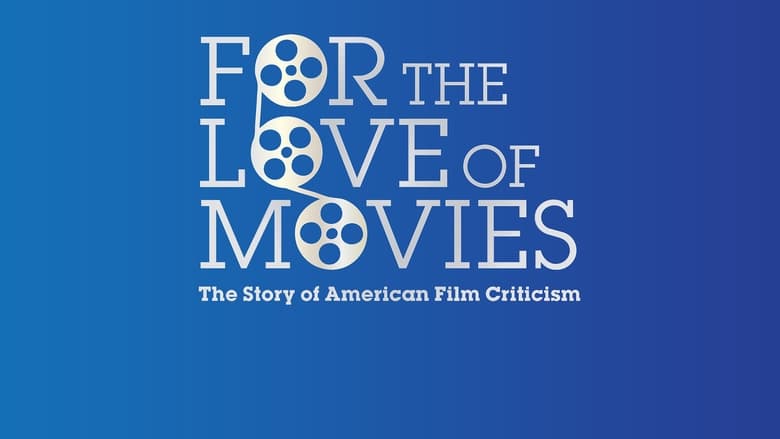

For the Love of Movies: The Story of American Film Criticism (2009)
The story of American film criticism.
Watch Trailer
Cast


Reviews
Slow pace in the most part of the movie.
If you like to be scared, if you like to laugh, and if you like to learn a thing or two at the movies, this absolutely cannot be missed.
Although I seem to have had higher expectations than I thought, the movie is super entertaining.
The movie turns out to be a little better than the average. Starting from a romantic formula often seen in the cinema, it ends in the most predictable (and somewhat bland) way.
I don't know why so many people have been critical of this production. If Gerald Peary hasn't put together a masterpiece, he's at least delivered a documentary history of film criticism, full of talking heads and clips from the films themselves, that is both entertaining and informative.The two most engaging points, I thought, were the feud between Pauline Kael and Andrew Sarris. I won't get into the substance of the conflict. Kael was a splendid writer who knew how to structure an essay, but, as a personality, she comes in second -- bitchy and manipulative -- while Sarris seems generous and forgiving.The other observation was that print criticism by professionals is fast disappearing, along with the media that were their conduits to the public. Experienced reviewers cost money. It's easier to replace them with red hots who will work for coolie wages. Furthermore, nobody reads newspapers or magazines anymore. Everyone is on the internet. (Even Gerald Peary.) If you want to write a movie review, you can do so, even if you can't spell your own name. I expect this reflects a general degradation of our arts.I'll give an example of what I mean by that last Olympian generalization. In, I think, 1968, Stanley Kauffmann was teaching film studies at Columbia. He had just shown Otto Preminger's "Joan of Arc" and asked for responses. Man, did he get them, and they were sophisticated too, comparing Preminger to Carl Dreyer's silent "The Passion of Joan of Arc," commenting on the evolving historical and regional images of Joan of Arc, drawing from Shakespeare, who portrayed her as a villain, and so forth. Kauffmann was inspired to write an essay, "The Film Generation", predicting that in another twenty or so years everyone would be as familiar with historical films as they were with classic novels. Twenty years later he wrote another essay, correcting himself. Students were dumber than ever. Not only couldn't they compare Dreyer to Preminger, they had to stretch for Joan of Arc. (My students were unable to identify my peerless impression of Jimmy Cagney.) Peary doesn't blame the internet entirely, and neither would I, but a general deterioration of our intellectual curiosity -- our willingness to face any kind of challenging material -- just seems so obvious. We elect governors because they've been stars of mindless movies and presidents because we'd like to have a beer with them. "Belles lettres? Think I'll pass on that. I'll have another chili dog, and a Bud for my main man here." And I suppose it's becoming excessive to ask that an indefinite article and a common noun be separate words -- "a lot" rather than "alot." And that "losing" shouldn't be spelled "loosing." On top of all that, today's youngsters are promiscuous, by cracky. Well, don't get me started. I get all excited, my pince-nez falls off.Among the ranks of talking heads, I sort of missed John Simon. Of course he's retired now but there ought to be footage of him around somewhere and he was by far the most savage of critics from the 70s and 80s. Who else, of the Maysles brother's "Gimme Shelter," featuring the Rolling Stones, could write: "Here we are, hungry for bread and the director gives us stones"? At any rate, I enjoyed this documentary and would recommend it to just about anyone with an interest in movies -- and to anyone under the age of 30, with or without that interest, because it will all be news to them.
"I am a part of all that I have met; Yet all experience is an arch where through Gleams that untraveled world, whose margin fades For ever and for ever when I move. How dull it is to pause, to make an end,"--Ulysses, TennysonMy major criticism of this film (about film criticism) is that it ends where it should begin: the future of film criticism. I saw this film recently at Dartmouth College on Winter Carnival Weekend. Whether due to competing campus events or cold weather, the film was attended by an audience of less than two dozen, nearly everyone eligible for a AARP film discount, if one had been available. Dartmouth College offers a robust Film & Media Studies program, but only a handful of students were in attendance, most arriving at film's end. This alone is probably testimony enough about the future of film criticism, but the closing on screen statement about the gangplank exits suffered by 28 major (print media) film critics in recent years reveals an ongoing mutiny not yet plundered for the reasons why.My own conjecture 'why' (offered as nothing more than by a film buff keyboarding here and now) is that you are reading the reason why: the ubiquity of the internet, and the suffusive flow, if not tsunami, of blogging. One blog catalog alone offers over 5,600 film blogs. Film critics, you have met the enemy and it is I.But back to the film, not the future, for now. For the Love of Movies (FTLOM if a textter) plays like a filmed version of Cliff Notes on the history of film criticism rather than an insightful exploration. Informative? Yes, but I am a 'film criticism' neophyte or idiot savant depending upon your take. So I learned some new names and film flotsam to toss out at the next dinner party I attend, but nothing to provide me with much of a cogent argument as to why we need to rescue any of those 28 film critics off the gangplank to guide us through the chop and swell of Avatar's 'perfect storm' of movie-making, blockbusters, 3-D, computer technology, and the future.As I watched FTLOM I was reminded of concurrent dynamics in other streams of criticism such as food and restaurant criticism (i.e. the demise of Gourmet Magazine), journalism, and music criticism, to mention a few. Now longtime culinary, journalism, and music critics are finding safe harbors harder to come by to avoid the plunder by today's pirates twittering and blogging away with iPhones and iPads. Arrgh! mateys, prepare to be boarded!So what lies on the horizon for the future of film criticism? The one thing I do know is that I may become an adventurer in this brave new world and journey to new vistas of critical opinion, discourse, and blogging, but that does not make me a navigator, GPS notwithstanding, nor a film critic. I still want to listen and learn from those who can tell me if (how, and why) a film can carry me to those newer worlds. Unfortunately For the Love of Movies provides scarce few cinematic buoys to help navigate the waters.So its fade to black and bon voyage. Ben Moore
Documentary about film criticism. It follows it from the days of silent cinema to the present. We're shown or told about the most influential film critics ever. Most memorable are Pauline Kael and Andrew Sarris and their debates through reviews. It also makes it clear that film critics are now being phased out left and right. The Internet has taken over. Many papers and magazines either cut down on their movie review staff or deleted them all together. It makes you wonder where will the next film critics come from and what they will be like. It's good and interesting but somewhat slapdash in execution. Scenes seem to wander all over the place and sometimes it gets WAY too intelligent for its own good (the auteur theory explained is all over the place). It's not a bad movie--just a good one. The director seems to lack a clear point of view and I wasn't sure what exactly he was trying to get at. Some of the commentary by critics is amusing and the clips from old movies are always welcome...but this left me kind of cold. I give it a 7.
I recently viewed Gerald Peary's "For the Love of Movies: The Story of American Film Criticism," at the Lake Placid Film Forum. It drew a small crowd. It wasn't aided by the seasonable weather, or its matinée schedule. But the audience knew there was something genuine about it. For the first time, to my knowledge, a critic has taken their discussion to the screen in order to prove the influence of film critique on cinema culture. The result was a fascinating look back to the beginning of the medium up to the modern age of internet based critics. The film gives us a brief history of film review, from the early writings of Robert Sherwood, to the debating Andrew Sarris and Pauline Kael. It further goes into the age of recognized television personalities like Roger Ebert and Gene Siskel leading up to the current realm where printed media is on the way out and people look to the web for reviews. The film asks its audience the question of why do we need film critics? Wesley Morris of the Boston Globe argues that they "expand and inform the reader about what is more than just a movie." Stuart Kalwans of The Nation further explains that "criticism is about your relationship to the work, the world and the shifting ways of that world." Each of these opinions is correct. However, a mentor of mine who recently passed away left these words—"I believe in writing and the power of art to transform consciousness." His name was Donald Kearns, a local resident of Plattsburgh NY who loved film and literature. It is my belief that this is the true nature of film critique, as is any critical opinion: to allow the reader to see another perspective. The film clearly illustrates that many of the original recognized film critics, like Sarris, were devout film lovers. The art of cinema set them free and provided for intellectual stimulation that encouraged their discussions. One of the reasons that I enjoyed this film so much was because of my own interest in film review. Several years ago I wrote for a local news-magazine near my hometown. I wrote a review for every movie that I saw theatrically, although only a handful were ever published. But it allowed me, a lonely film buff, the opportunity to reach out to others and create a discussion. In so doing, I met the most extraordinary people: film lovers, writers, exhibitors, musicians, professors and people from all walks of life. And every one of them had something to comment on, whether they liked the movies or not. Moreover, "For the Love of Movies" expanded my own knowledge not only of the review process, but of influential theories by Sarris and Kael. Their collected works influenced filmmakers of their generation and the next. But as we head father into the future, and critique jobs become eliminated by online clip-quotes, movie marketing campaigns only emphasize what is big, loud and aggressive. As such, we lose something so valuable—the genuine voice of those who love film. There is debate between filmmakers and critics as some movies reviewed are poorly received. Filmmakers may ask the question to critics, do you think you can make a better movie? Maybe they can. Maybe they cannot. The truth is that it does not matter. Critics are connoisseurs of film. They do not have to go and produce something better because that's not their job. My advice to filmmakers is to take it all in stride. The process of making a movie is like crafting an art form. Not everyone will appreciate your perspective. After all, a person can be a wine lover and have never made their own bottle. And how many people do you know who love cars but have no idea what is going on beneath the hood. Alarmingly enough, over 28 major film critics for printed journals have lost their jobs in recent years. The situation is not helped by the current economic times, as well as the push to websites. Some formerly employed critics are now heading to the web. However, the internet has given rise to its own breed—James Berardinelli is a perfect example. He is a web based film critic who can actually write a fine review whether you agree with him or not. But there are so many others who only comment on what is flashy or the current fads in the market. Therefore, how can their opinions be justified if they cannot provide a backdrop to compare a film against?My advice to the average reader seeking movie recommendations is trust your best judgment. It's easy to see the hacks and the ones who actually care about film. Even with the shift from print media to online sources, critics will go on. There's always going to be a different perspective out there that deserves its recognition. But who will be the next film critic, online or in print, to truly change the way films are perceived? We'll just have to wait and see. In the meantime, see "For the Love of Movies" and get the other perspective that is being shut out from our society.




